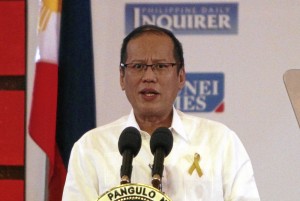To get economic program moving: ‘Just do it’
(Conclusion)
Two-thirds of the big-ticket projects under the Aquino administration’s Public-Private Partnership (PPP) Program fall under the ambit of the Department of Transportation and Communications.
When Transportation Secretary Manuel Roxas II came on board earlier this year, his first order of business was to order another review of the 10 big-ticket projects already vetted by the economic team and “launched” by President Benigno Aquino III in November 2010.
The result was the cancellation of the tenders for the operations and maintenance contracts for the Light Rail Transit Line 1 and the Metro Rail Transit Line 3, which—at P7.7 billion and P6.3 billion, respectively—Roxas felt were too expensive for the government.
The two contracts were considered two of the easiest PPP deals to get off the ground, since both required only the selection of private investors that would operate either rail lines at the least cost to the government.
Fast forward to last week—five months later—and Roxas found himself unveiling details of his department’s P500-billion, five-year transportation infrastructure plan, dubbed “P-Noy’s Capex Program.”
“Capex” is the finance shorthand for “capital expenditure.” Balanced budget-oriented economic managers have been hesitant to allocate resources for capex since last year.
Before a supportive Makati Business Club crowd, Roxas delivered a 46-minute speech, followed by a 30-minute question and answer.
ODA route
Throughout the session, Roxas mentioned “PPP” only once—and in passing, at that—as a less preferred option, behind the now preferred and familiar official development assistance (ODA) route.
Further turning the PPP Program on its head, Roxas announced that he preferred that infrastructure projects be built by the government using concessional loans from foreign donors. Only when completed can the projects be offered to private investors for them to operate.
Several of the businessmen in the Manila Intercon ballroom that afternoon—many of whom were eager to invest in the PPP program—exchanged silent and knowing looks as Roxas unveiled what looked like a new direction for the slow-burning flagship economic program. Even the “PPP” name had been changed, it seemed.
Indeed, to restore the local economy on a higher growth trajectory, Solita Monsod, a former National Economic and Development Authority (Neda) director general, believes the Aquino administration must redouble efforts to accelerate spending and push infrastructure projects through the log-jammed pipeline.
“What happened to the projects that were ready?” Monsod asked. “What the hell is this? What are they looking for? If they’re looking for the perfect project, it’s not going to happen.”
More importantly, Monsod, a member of President Corazon Aquino’s Cabinet, said the Neda had seen the economic slowdown coming long before it actually happened through “leading indicators” as early as March 1.
“I’m told that the Neda wrote memoranda, both to the Development Budget Coordination Committee and to the Office of the President, saying that this underspending is going to hurt us,” she said. “But nothing happened.”
“There has been a delay and it is unconscionable,” Monsod said, explaining that there is an existing legal framework for the PPP scheme in the 1990s-era built-operate-transfer law.
“There is no excuse for it because it was not as if we were starting from square one,” she added.
What a waste!
Aggravating the feeling of “sayang” (close to “What a waste!” or “What a pity!” in English) among businessmen is the fact that borrowing rates worldwide have been at historic lows over the last two years.
Money has never been as “cheap” at any other time in history as it has been since the end of the 2008 global crisis. And interest rates have now begun to creep up.
The golden opportunity of having cheap funding sources is being wasted because no PPP projects are available to invest in, they pointed out.
Asked whether Mr. Aquino’s limited experience as a “conductor” of the large executive branch orchestra was a factor in this, the Makati Business Club chairman, Ramon del Rosario Jr., said that this should theoretically be remedied by having the best advice from the best Cabinet members and advisers.
“The economic managers have a lot more flexibility to do the things they do as long as they stay within the parameters set by the President,” Del Rosario said.
This management model assumes, of course, that the President is getting enough options and the best advice from his people on the economic front.
Harsh daylight
During the launch of the PPP Program last year, the President emphasized as his theme the return of “daylight” to the Philippines (borrowing imagery from Ronald Reagan’s 1984 “It’s morning again in America” speech).
Under Mr. Aquino’s watch, deals would no longer be hatched in the secrecy of night, as in past administrations, but in the light of day, with full transparency for everyone to see.
“Daylight is our strategy for rectifying errors in what are, after all, human undertakings,” the President said. “Daylight is the standard of performance both you and I will expect of the Philippine government, where things are not done in the dark, but rather, where our formula for success is integrated into the procedures we are all obligated to follow.”
A year later, it appears that daylight not only unmasked the excesses of the past administration but also showed that the current economic team was unprepared to implement Mr. Aquino’s vision with the urgency that the country needed.
Everyone the Philippine Daily Inquirer interviewed agrees that it’s not too late. But everyone also agrees that the window of opportunity is becoming a little smaller with each passing day.















